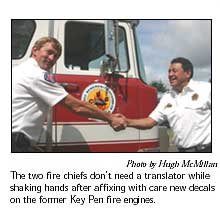 On a piece of land two-thirds the size of Washington state, the bomberos of Guatemala make sacrifices that no doubt defy logic for their American counterparts. The bomberos — firefighters — often go into raging fires without basic gear and breathing apparatus. In Guatemala, until a few years ago, ambulances were made of pickups with canopies and “emergency care” hardly fit the description. Only 30 of the country’s 130 fire stations have fire engines. The rest make do. And 90 percent of those risking their lives in the course of duty do so without being paid a penny.
On a piece of land two-thirds the size of Washington state, the bomberos of Guatemala make sacrifices that no doubt defy logic for their American counterparts. The bomberos — firefighters — often go into raging fires without basic gear and breathing apparatus. In Guatemala, until a few years ago, ambulances were made of pickups with canopies and “emergency care” hardly fit the description. Only 30 of the country’s 130 fire stations have fire engines. The rest make do. And 90 percent of those risking their lives in the course of duty do so without being paid a penny.
Understanding the thrill of receiving two donated “beat-up” fire trucks can perhaps best be compared to a child’s joy of getting a much-anticipated Christmas present. When a couple of bomberos in July got to proudly affix new decals with the words “bomberos voluntares” on two surplus KP Fire District engines, a small but emotional ceremony was filled with good deeds and humble talk. One only had to listen to the story of the country’s fire chief to understand why two hand-me-downs with enough wear and tear to give a mechanic lifetime job security were such a big deal.
“In Guatemala, we don’t have enough money to purchase equipment in the volunteer fire department, and for us to buy one of these engines, we would have to make a lot of sacrifices,” Cesar Gonzalez, the country’s fire chief, said through a translator. “These engines will save a lot of lives back home.”
Gonzalez and seven fellow bomberos traveled to Washington state in July to accept the engines, packed with various equipment and gear, along with a container filled with medical equipment donations. The KPFD ceremony was hardly finished when in the middle of a group photo session a truck pulled up. Laura Cameron from Dr. Roes’ office and her daughter Jen started unloading equipment donated by the doc — cardiac monitors, oxygen equipment and lots more — along with blankets, walkers and other items.
Cameron had somewhat of a personal interest in helping: She had visited Guatemala on a mission trip and was planning another one in the near future. “The villages had no electricity and medical care; they live off what they grow,” she recalled. “It was an eye opening experience.”
Dr. Roes had already unloaded donations previously but obviously that wasn’t enough, thus Cameron was dispatched at the last minute. That is the sort of generosity that Pierce County agencies and residents have shown ever since word came down that the bomberos were coming.
But this trip is but a small touch. For several years, area rescue personnel have been making regular trips to Guatemala to bring supplies and much-needed training. Key Pen resident Ron Quinsey, a paramedic with the Lakewood fire department and a state EMT instructor, is among those helping build the Guatemalan EMS system from the ground up. Using their own money and time, Quinsey and other colleagues visit the country for a couple of weeks at a time every year — and since they became involved, many of the makeshift ambulances have been replaced with real ones, the paramedics received modern equipment, and lives have been saved.
“Ron Quinsey helped us build the EMS services with training and supplies. They are so concerned about it that they spend their own money to help us,” Gonzalez said.
The Good Samaritans have plenty of help too. Donations from several Rotary clubs and other organizations are making sure the Guatemalan medics slowly get what they need. The Parkland-Spanaway Rotary leads a nationwide drive to raise money for the project. Initially, $25,000 was spent, then another $50,000 and recently a $160,000 grant was approved that will provide airway trauma kits and other basic equipment for every station, along with training.
“They are much better off than they were a few years ago…They take so much pride in their work,” said Paul Embleton, a captain with Central Pierce Fire and Rescue who has made 24 trips in seven years to help train the Guatemalans, starting with a pilot program that continued to grow.
By the time T-shirts and other memorabilia were exchanged between the two fire districts at the Wauna fire station, Gonzalez said the members of the two departments were like brothers. For the Key Pen fire fighters, perhaps all that will be left are the warm memories, a plaque and the vague recollection of the occasional embarrassments posed by the two engines, bought at the bargain price of $11,000 for the set, when they would quit in the middle of a service call. But for the bomberos whose government spends less than a half-million dollars for the entire country’s emergency response system, those two little engines and the generosity of so many strangers cannot be measured in currency or worn out parts. This is the human spirit at its best.
UNDERWRITTEN BY THE FUND FOR NONPROFIT NEWS (NEWSMATCH) AT THE MIAMI FOUNDATION, THE ANGEL GUILD, ADVERTISERS, DONORS AND PEOPLE WHO SUPPORT INDEPENDENT, NONPROFIT LOCAL NEWS